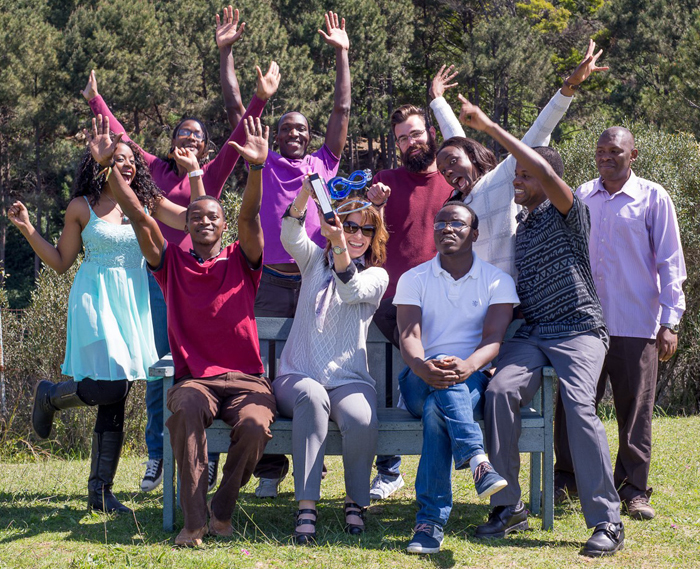Dynamic commerce team wins national water award
05 October 2015 | Story by Newsroom
iCOMMS, a research team in the Faculty of Commerce at UCT has picked up an award for its novel use of cellphone technology to help rural communities with water management.
Each year, the Water Research Commission of South Africa recognises exceptional contributions to the water sector.
This year, the commission chose Professor Ulrike Rivett and iCOMMS, a research team in the Department of Information Systems in the Faculty of Commerce, for their work using mobile technology to improve water management in rural areas.
The iCOMMS team has been working on a system that communities can use to transfer information from outlying areas to municipalities so that they can respond quickly and proactively to any problems. Rivett leads a team of 15 PhD and master's students, and her payoff is not only in publications with iCOMMS team members, but also the experience of breaking ground in the research that is being done.
She explains: “We started off with developing mobile applications for water quality management, which were implemented in Asia and Africa. Today we are able to understand ICT and its potential in far more detail, and are able to distinguish between over-enthusiasm and the reality of using mobile phones to improve service delivery.”
The team has also contributed to a recent World Bank study titled 'Unlocking the potential of ICT for water and sanitation in Africa'.
Appropriately for a commerce team, iCOMMS is run along business lines. The team leader raises R2-million annually to support the PhD students, who have weekly meetings with their supervisor where minutes are taken and each member learns how to run a meeting. The spirit of professionalism flows through to innovative business cards, a dynamic website and social media sites as well as a stunning logo. They intrinsically understand the value of their brand.
“I like the idea of graduate attributes and it is perhaps easier to develop these in a research team,” says Rivett. In some cases, the interventions have been as simple as advising students not to turn up in flip-flops to a meeting with government officials.
Says Rivett: “Everything I have done is based on watching really great academics. It is about creating a team with a common vision and recognising that this team is crucial for our success. The challenges we are facing are not solved by one person.”
And, yes, there have been hard times too. “We've had tears, but we push through and hold onto our goals. Sometimes we do Skype calls at night after work. That is what it's like in the professional world,” she adds.
The students agree that training communities in the use of new technologies, understanding the complexity of rural water management, and engaging in the politics of local governance has been a rewarding and interesting journey.
Says Shamiso Kumbirai: "The multi-disciplinary iCOMMS team has given me the opportunity to gain insight into the world of ICT, particularly how to leverage mobile technology to provide better services to communities. This has also given me a new perspective on how citizens can participate in the governance of issues affecting them….
“What I enjoyed most was having the chance to make new friends and share my research journey with like-minded academics who are dedicated to improving service delivery for all Africans.”
For Carl Jacobs, the team's diversity is central to their achievements: “Knowledge sharing amongst people from different backgrounds is one step to building the bridges we need to overcome the gaps that exist between the traditionally separate silos of knowledge. The world is a complex, integrated system and should be treated as such. The key to solving its problems lies in exposing oneself to the diversities it has to offer and effectively synthesising the ideas that come out."
Bianca Forlee agrees: “The iCOMMS team is very diverse in the skills that the team has to offer and the different approaches to problem solving. Everyone comes from a different field of study and we somehow managed to combine them to form a dynamic team. I have learnt so much from my friends and fellow researchers. I learnt that I am capable of more and that keeping a sense of humour is the best approach when things get tough.
“And if you're late to a meeting, you have to bring a cake!”
Story by Carolyn McGibbon. Photo supplied.
 This work is licensed under a Creative Commons Attribution-NoDerivatives 4.0 International License.
This work is licensed under a Creative Commons Attribution-NoDerivatives 4.0 International License.
Please view the republishing articles page for more information.










